Climate change poses a significant threat to global corporations, and financial regulators must transform how they account for the economic risks of a warming planet, Citigroup said in a new report Wednesday.
"Greenhouse gas emissions, global warming and climate change are not only existential issues for those concerned with the future of humanity, they are also immediate concerns for financial regulators," the report said.
The report, titled "Managing the Financial Risks of Climate Change," divides the threat of climate change into two categories: financial risks associated with effective action toward transitioning to a lower-carbon economy, and risks associated with a failure to effectively mitigate climate change.
Financial regulators have primarily focused on how climate change impacts big investor's liabilities and how they can improve conditions for low-carbon investments.
The European Central Bank recently contended that central banks should go even further, and account for climate change risks not just as part of ensuring financial stability but also when setting monetary policy.
Governments will also need to take steps toward a low-carbon economy, the report said, including implementing a carbon tax, cap-and-trade plans with emissions trading systems, and regulation to limit carbon pollution.
The report on climate risk comes shortly after a slew of extreme weather events across the world, as well as a series of environmental regulation rollbacks in the U.S. by the Trump administration.
Most recently, Hurricane Dorian stalled over and decimated the Bahamas, and raging wildfires have destroyed a large swath of Amazon and Bolivian rainforests.
In July alone, the hottest month ever recorded, a heat wave scorched Europe, then moved to Greenland to cause record ice melt there; fires tore across Russia and the Arctic; Hurricane Barry flooded parts of Louisiana; and U.S. farmers got hit with a severe heat wave after suffering from a year of record flooding.
'Heed these warnings'
Climate researchers warn that these extreme weather events are growing more frequent and intense as the planet warms, and will continue to exacerbate sea level rise, sea ice loss, ocean acidification and biodiversity destruction.
"It behooves the private sector to heed these warnings and to adjust their own business models and practices accordingly. Financial risk from climate change is here to stay," the report said. "Prepare now or pay later."

Citi said that corporations are unlikely to treat climate change as a separate risk class, alongside market risk, credit risk and others. While financial institutions try to quantify those risks on a daily basis, climate change will likely be treated as a threat amplifier to other existing threats.
The economic costs of climate change are becoming more clear. Carbon emissions in the U.S. cost the economy about $250 billion per year, one study showed.
Globally, the economic costs from natural disasters have exceeded the 30-year average in 7 of the last 10 years, according to the Citi report. The risks are most concentrated in warmer parts of the world, where poorer countries are located.
For major companies across the world, trillions of dollars are at stake as climate change threatens to disrupt their supply chains and stricter climate regulations could impact the value of oil and gas investments.
For instance, the Carbon Disclosure Project analyzed disclosures from 215 of the world's 500 biggest corporations and found that these companies faced about $1 trillion in costs related to climate change in the decades ahead. By the companies' own estimates, a majority of those financial risks will be felt over the next five years.
The most recent report from the United Nations' Intergovernmental Panel on Climate Change warns that if greenhouse gas emissions continue at the current rate, the atmosphere in 20 years will warm up by 1.5 degrees Celsius above pre-industrial levels.



